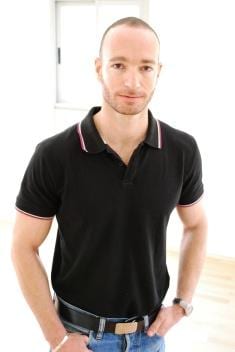
A HOME. As a Tel Aviv city councillor, Etai Pinkas fought successfully for a dedicated, government-funded gay and lesbian community centre. Credit: Matt Mills photo
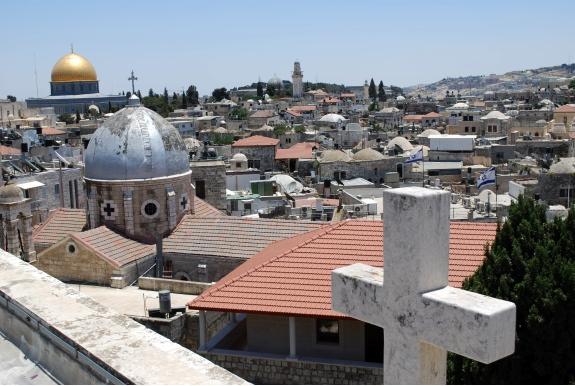
Jerusalem Credit: Matt Mills
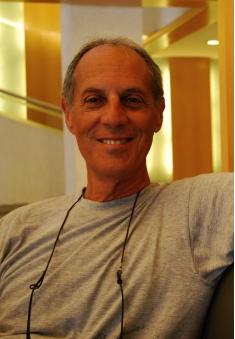
FOUGHT FOR CHANGE. Jonathan Danilowitz fought to earn partnership benefits for gay and lesbian people in Israel. He's a gay, atheist, Jewish, Israeli, South African expatriate who says Israel is not an apartheid country. Credit: Matt Mills photo
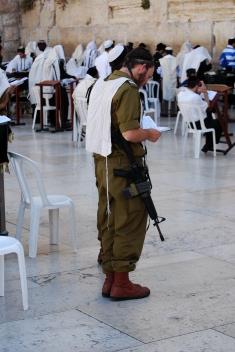
Credit: Matt Mills photo
Jaw-droppingly, tongue-tyingly, do-me-now gorgeous doesn’t do justice as a description of the men of Israel.
The diverse personalities of the people are attractive too, once you learn some of the social conventions. Initial interactions among strangers can be furtive. But once the ice breaks, gay Israelis are warm and conversation comes easily. Israelis are more than willing to talk politics.
“We are a country of critics,” says Jonathan Danilowitz. “We criticize each other, we examine each other, we learn and teach each other. I’m very proud to be part of that. We don’t sweep it all under the carpet.”
Danilowitz lives with his long-time partner in a gorgeous Tel Aviv apartment overlooking the sparkling blue Mediterranean Sea. He is also gay royalty in Israel.
In an incredibly short period, just 20 years, gay Israelis have earned some astounding victories in the struggle for liberation. And it was Danilowitz who, in 1989, as a flight attendant for El Al Israel Airlines, very publicly demanded that his employer extend equal benefits to his partner.
It was a huge story around the world, and Danilowitz prevailed every step of the way to the Israeli supreme court. It took six years. When the last of El Al’s appeals was denied, he was on layover in Bombay. The next day, Danilowitz worked the return flight to Israel.
“There I was, walking down the aisles handing out newspapers to passengers with my picture on the front page,” he remembers. “That was very sweet.”
Behind that victory came a wave of gay liberation in Israel that included further partnership rights, employment discrimination protections, adoption and surrogacy rights, survivor benefits and protections for gay military personnel.
And today various levels of government in Israel bankroll many gay community efforts that need money to prosper. In Tel Aviv for example, the gay film festival, Pride celebration and gay community centre are all paid for by the municipality.
“It’s the only gay community centre in the world that is built and financed completely by the government,” says Etai Pinkas, who as a Tel Aviv city councillor brought the project to fruition. “Even the annual budget is from city hall: it’s actually like a department of the municipality. The employees here receive their salary from the city. It’s very unique.”
Why does gay liberation do so well in a country with such a history of bloody conflict?
“Because of the political conflict surrounding us,” says Danilowitz. “The authorities don’t have much time, energy or power to bother about homosexual rights. We’re an annoying mosquito but there’s a huge buzzard on the other side trying to get their attention. To that extent we’re lucky that we have so much conflict surrounding us.”
“When you’re an Israeli parent, the main thing is, ‘How do I stop this kid that I have from dying?'” says Gal Uchovsky, filmmaker, gay activist and Simon Cowell-figure on the Israeli version of American Idol. “Everything less than dying is not that bad. ‘The kid is alive — maybe his boyfriend will be a doctor. Gay is not that bad.’ It’s a good way of understanding Israel.”
But television, Tel Aviv and gay people represent something of a bubble within Israel. Religious Orthodox groups remain hugely influential across the country; Tel Aviv is sin city, and overriding everything is the larger ongoing conflict.
THE ELEPHANT IN THE ROOM
Beginning in the summer of 2008, violent tensions between Israel and the Palestinian territories escalated once again. On Dec 27, 2008, Israel launched a large military attack against the Gaza strip. Its stated aim was retaliation for a series of mortar and rocket attacks against Israel by Hamas.
According to various sources on both sides of the conflict, almost 1,500 Gazans were killed in the ensuing three weeks. Most of them were civilians, including hundreds of children. There were 13 Israeli casualties, four from friendly fire. It was rather more of a brutal beating than a war.
Allegations of Israeli atrocities came from all corners of the world. Israel has for years restricted civilian movements in and out of Palestinian territories. It has erected myriad fences and walls to keep Israelis and Palestinians separated. There was an organized effort among human rights activists to end Israeli apartheid.
On Oct 16, 2009, the United Nations Human Rights Council endorsed a Gaza war crimes report that says Israel used excessive force and Hamas targeted Israeli civilians. It clears the way for potential war crimes prosecutions on both sides. The move is supported by Palestine and rejected by Israel.
Full disclosure: Xtra visited Israel in June 2009 as a guest of Holigays, a small company Danilowitz runs with a business partner. The two work to promote Israel as a tourist destination for gay people. Although the publishers of Xtra paid a fractional sum, we would not have taken the trip if Danilowitz’s company had not helped to defray the costs.
Xtra did not visit the Palestinian territories. It’s an imperfect situation for a journalistic piece, but the alternative was to stay home, watch CNN and learn nothing at all about Israel.
Danilowitz is a white South African expatriate who fled to Israel in 1971 to escape anti-Semitism, homophobia and racial apartheid in that country. He is a white, Jewish, atheist, gay activist entrepreneur. And an Israeli patriot “with my eyes open,” he says. “Wide open.”
What does he think when he hears the term “Israeli apartheid””?
“I say to myself, ‘How stupid can you be to make such a comparison?’ It’s insane,” he says. “South African apartheid was a white minority oppressing a black majority who had done nothing except live. The Arabs in this huge majority around us are trying to drive Israel out of existence, and Israel is fighting back. Israel is not an apartheid country.”
If you believe the very survival of your friends, family and country is at stake, it must have a profound influence on your worldview.
Sa’ar Nathaniel is a Jerusalem gay activist, entrepreneur and politician. He sat on Jerusalem city council in 2006 and was instrumental in the fight for annual gay pride marches in Jerusalem, previously forbidden by ultra-Orthodox elements in the city’s government. He was simultaneously the proprietor of Sushan, a now-closed Jerusalem gay bar that hosted a tight community of gay Israelis and Palestinians.
“I am also a left-wing Israeli,” says Nathaniel. “I really think we need to compromise about a Palestinian state next to Israel, and I’m ready to negotiate that East Jerusalem will be the capital. But I think a lot of people in Europe and North America don’t see the conflict clearly. What happened in Gaza is terrible. But if Israel was simply open to all Palestinians, the courts would not be able to defend me. Ask yourself about Hamas and its ideology about women, about gays and about Israel. For me, Hamas and the ultra-Orthodox are more or less the same.”
That ultra-Orthodox elements in Israel are comparable to Hamas is a theme repeated often among gay Israelis. Religious zealotry, Muslim and Jewish, mandates any means necessary to suppress dissenters and to impose God’s will. Every gay Israeli we spoke with underscored that point.
It was an ultra-Orthodox man, for example, who attacked gay pride marchers in Jerusalem in 2005, stabbing three. The gunman who killed two in a gathering of gay teens in Tel Aviv on August 1, 2009 has still not been caught.
Gay people in Israel overwhelmingly want to help gay Palestinians, they overwhelmingly want to avoid bloodshed on all sides, they overwhelmingly object to Israel’s heavy-handed approach in Gaza, and they want the ultra-Orthodox elements in Israel to compromise so the fear and fighting can end. They are potential allies to the activists and humanitarians around the world who want action against Israeli apartheid. They just want an outcome, they need an outcome, that protects them as gay people and as Israelis. So, to some extent, pressuring them to effect change is a bit like preaching to the choir. They are already invested.
It seems also that there may be a double standard or two at work. Human history is virtually one long uninterrupted story of conquest and domination. The Canadian government has a long history of oppression of its indigenous peoples. Canada is part of the force that invaded Afghanistan and is mired there in its own humanitarian morass. And clearly the US and UK invasion and occupation of Iraq is deeply flawed and bloody. Racism in the US remains endemic, and the US has built its own walls, virtual and real, in a stated effort to protect itself.
But you don’t see Western human rights activists demanding the same level of accountability from their own domestic governments for very similar, but often larger-scale, affronts to human rights.
Ultimately, we can only hope and work to ensure that human decency and peace prevails everywhere. And one of the best ways to equip ourselves to make a positive contribution is to travel. Israel is truly a fascinating destination for gay travellers: There’s fun, very stimulating gay life, history, culture and moral puzzles that you won’t be able to solve. It’s safer than you think, and you likely won’t succeed in building a meaningful understanding of the Middle East or its people unless you go there.
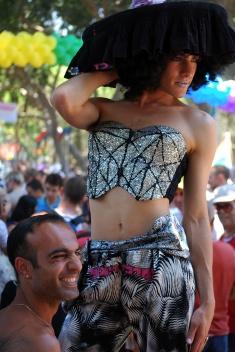
 Why you can trust Xtra
Why you can trust Xtra


